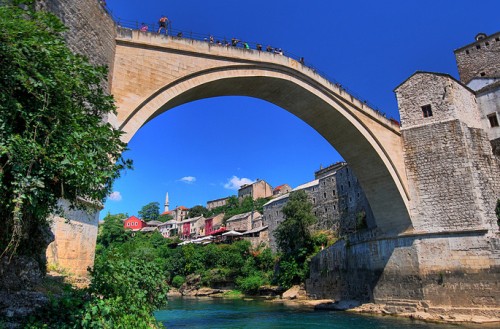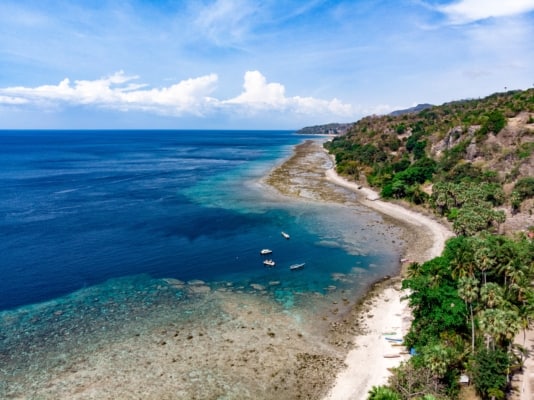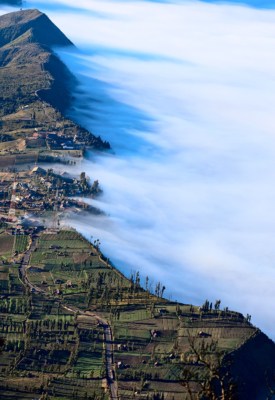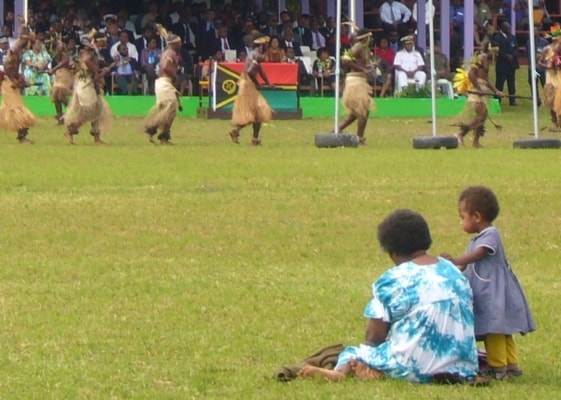Image: Mostar’s rebuilt ‘old bridge’ (BiH), considered a symbol of reconciliation (Kevin Botto, Flickr).
DLP hosted a day-long high level introductory workshop on political settlements in June. This post is the first of a series inspired by the workshop and written by researchers, policymakers and practitioners. Here Alina Rocha Menocal discusses current research and thinking on the usefulness of a political settlements approach.
Over the past decade, there has been growing recognition that the challenge of development is not so much what needs to be done, but, crucially, how. The processes that facilitate or obstruct change are what really matter. This places the need to understand politics and institutional dynamics at the centre of thinking and practice in international development – and with it the concept of the ‘political settlement’.
In particular, the promotion of more inclusive political settlements and political processes is increasingly the focus, especially in efforts to foster more resilient, effective and legitimate states, and more fruitful interactions between state and society. But while the emphasis on inclusive political settlements is certainly right, many questions about what inclusion actually means remain unanswered.
Who, for instance, is to be included? An analysis of existing comparative literature suggests that elites play a crucial role in driving and shaping political settlements. Inclusive elite bargains, especially in terms of the incorporation of former combatants and the distribution of access to positions of state power across different elite groups, are crucial to secure the peace, especially in the short term.
More sweeping conceptual historical research, including, for example, Acemoglu and Robinson’s Why Nations Fail, suggests that, over the long term, more inclusive states also tend to be more peaceful and resilient. And this kind of inclusion encompasses the broader population, not just the elites among competing factions that might otherwise resort to violence.
However, this does not say anything about how institutional change happens over time, and how, in fact, the boundaries of a political settlement that starts out by focusing on elite inclusion can be expanded to create a more broadly inclusive political order.
Or what about identity and nation-building? These are issues that donors have tended to overlook. But as the pioneering work of Frances Stewart shows, horizontal inequalities, or inequalities based on group identities such as ethnicity, class, or territory, are a leading driver of fragility and conflict. When state elites use group-based identities as a rallying mechanism for exclusionary nation-building, then exclusionary political settlements provide the foundation for biased processes of state formation. This generates resentment among excluded groups and does much to foment violent conflict. Examples abound: apartheid in South Africa; the north-south conflict in Sudan; exclusion based on class and race in Guatemala; ethnic tensions in Burundi, Rwanda and Kosovo; the separatist movement in Aceh, Indonesia; and sectarian violence in Northern Ireland and Iraq.
By contrast, available evidence seems to suggest that political settlements that are grounded on inclusive nation-building projects tend to be more stable and resilient over time. These kinds of political settlements may well be quite narrow in terms of the actors/elites included at the top. But they incorporate the population at large in a shared sense of national destiny – or, as Benedict Anderson would put it, an imagined community that can transcend more narrowly defined identities. A good example of this is Ghana, a remarkably peaceful and stable multi-ethnic country where state formation processes based on a unified ‘Ghanaian identity’ emerged early on as a crucial nation-building strategy.
Then there’s a distinction between inclusion in terms of process (how decisions are made) and inclusion based on outcomes (how wealth and resources are distributed). As with the issue of identity, political settlements that may be considered narrow at the top can in fact produce distributional outcomes that are broadly inclusive. The so-called Asian tigers such as South Korea, Singapore and Taiwan, and more recently, countries like Rwanda and Ethiopia, are all good examples of this. Yet in other countries across the global South, many reforms intended to promote process-based inclusion – such as new constitutions, elections, and anti-corruption and transparency policies – have not been able to deliver sustained growth and shared prosperity.
This leaves us with a set of difficult questions that have less than straightforward answers:
- To what extent can various forms of inclusion compensate for other ongoing weaknesses within the state and in the links between state and society?
- Are there any tensions, dilemmas or trade-offs between process-based inclusion and outcome-based inclusion?
- What persuades elites to pursue more or less inclusion, whether in process, outcomes, or both?
- How can bottom-up pressures for change affect or shape political settlements?
The widespread assumption in international development circles is that broadly inclusive political processes will be able to reshape a political settlement and lead to substantial transformation. However, as history shows, this should not be taken for granted.
Take the contrasting transitions from conflict and authoritarianism to peace and democracy in Chile and Guatemala. The pact that ended authoritarian rule in Chile was a top-down process, heavily controlled by the military, with severe restrictions on the actors involved and the issues it addressed. From a process inclusion perspective, it offered little promise for transforming the underlying political settlement. By contrast, the peace process that ended Guatemala’s armed conflict and ushered democracy was highly participatory and comprehensive. Yet, more than two decades on, it is in Chile where a more inclusive political settlement has evolved, while in Guatemala, the underlying power relations and elite privileges remain untouched.
So while broadly inclusive political settlements do matter, the process of reaching them is complicated. The path is likely to be rocky and non-linear, and to entail tensions and trade-offs between equally worthy but competing priorities.
For more from Alina, see her paper commissioned by DFID, Inclusive Political Settlements: Evidence, Gaps, and Challenges of Institutional Transformation (June 2015), and her DLP paper building on this: Political Settlements and the Politics of Inclusion (October 2015).
See more Opinions posts on political settlements.









